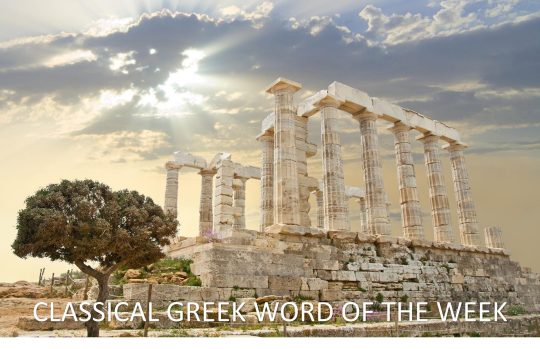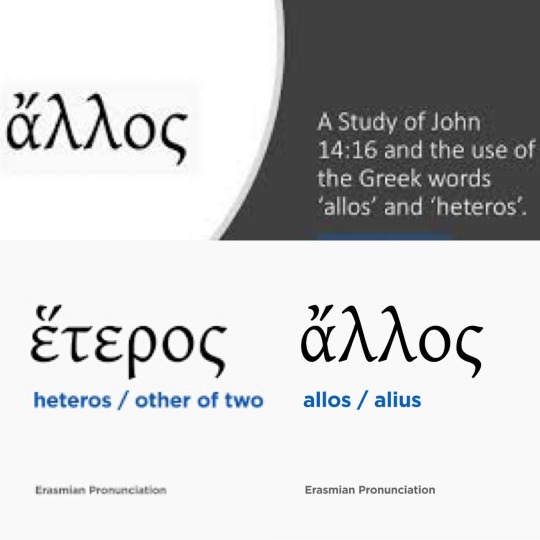#πνεῦμα
Text

Where the Light really is (2nd version)
Mixed media
2023
(Lic.: CC BY-NC-ND 3.0)
#dark art#neopictorialism#sepia#noughtlux#chiaroscuro#still life#roses#flowers#light#pneuma#πνεῦμα#metaphysics#figurative#mixed media#artists on tumblr#art#CC BY NC ND
322 notes
·
View notes
Text

NOUGHTLUX
Spiritus A (2nd version of 'Spiritus')
Mixed media
2023
(Lic.: CC BY-NC-SA 3.0)
#dark art#sepia#noughtlux#neopictorialism#roses#lights#still life#flowers#metaphysics#botany#πνεῦμα#pneuma#artists on tumblr#art#CC BY NC SA
99 notes
·
View notes
Text
The Classical Greek Word of the Week is πνεῦμα #spirit #greek #classicalgreek #bible #history #πνεῦμα
The Classical Greek Word of the Week is πνεῦμα #spirit #greek #classicalgreek #bible #history #πνεῦμα
Greek: πνεῦμα, -ατος, τό
Category: noun
English: spirit
… Bible Strong’s Greek 4151 4151. pneuma Strong’s Concordance pneuma: wind, spirit Original Word: πνεῦμα, ατος, τό Part of Speech: Noun, Neuter Transliteration: pneuma Phonetic Spelling: (pnyoo’ mah) Definition: wind, …
Thank you for visiting!
Sources:
Hebrew Univeristy of Jerusalem
Israeli Institute of Biblical Studies
Strong’s Greek…

View On WordPress
1 note
·
View note
Note
(Psst! On your alt text you mixed up ousia and pneuma furina) Hope your day is good! 👋
Ah! Thank you for mentioning it! I’ve gone back and fixed it now. (So Pneuma Furina is the archon persona, and Ousia Furina is the human… huh.)
I’m kind of tired today but it’s not terrible or anything haha. I hope you’re doing well too.
-
If I could know the meaning of the terms “Pneuma” and “Ousia” it’d be easier to differentiate them (as someone who’s not big on battle mechanics).
(Note that I don’t know Greek or any historical linguistics so I’m just looking through wikitionary here.)(You’re a linguist, I believe? This will probably make more sense to you than to me hahaha…)
Let’s see. The Arkhe page on the Genshin Impact wiki says Pneuma and Ousia both have Ancient Greek roots:
“Pneuma” (Ancient Greek: πνεῦμα) means “breath”, or in a religious context, “spirit” or “soul”.
“Ousia” (Ancient Greek: οὐσία) is “essence” or “substance”, an Ancient Greek philosophical and theological concept.
…? [thinking emoji] It’s not related to light/dark like I thought it’d be haha..
Oh but, “Pneuma” does look similar to “pulmonic” which
(checks Wikitionary) comes from pulmō (Latin: “lung”) which
(checks Wikitionary) shares the same etymological ancestor as, amongst other words, the Ancient Greek πλεύμων (pleúmōn)?
(From Wikitionary pages for “ousia” and “pneuma”)
“ousia” in theology can refer to “the essential nature or ‘substance’ of God”
“pneuma” in Gnosticism is the spirit, with the other two levels of a human being being body and soul
…Maybe it’s like how Pneuma Furina is the spirit of Focalors, and Ousia Furina is the essential (human) nature of the god Focalors (or.. something like that. A lore-enthusiast can probably connect these two together better than I haha)
#dusk answers#genshin impact#Furina#pneuma#Ousia#4.2 spoilers#etymology#Genshin analysis#genshin lore#linguistics#Genshin translation#….?..??#dusk analysis
8 notes
·
View notes
Text
like if u think about it. the Father is the gloryhead. like i can't explain it. of course the Son and the Spirit point to him like, he's the gloryhead!! he is the Enactor!! and of course the Spirit flows and works and is In the Other Two. like literally πνεῦμα. it's giving breath it's life inside you it's all around. and the Son... well i can't speak more on that but you get it. like God is all one thing but they're different things. symbolism. etc. etc......
#timothy's txts.#not to be all parent issues but of course the son is a reflection of the father. that's how parents work
2 notes
·
View notes
Text
On Christ's Baptism
Anthologia Palatina I.47 (unknown Late Roman/Byzantine author)
From the immortal Father came down Spirit full of might
When the Son was baptized in the currents of the Jordan.
πατρὸς ἀπ᾽ ἀθανάτοιο μεγασθενὲς ἤλυθε πνεῦμα,
υἱὸς ἐπεὶ βαπτίζετ᾽ Ἰορδάνου ἀμφὶ ῥέεθρα.

The Baptism of Christ, Joachim Patinir, 1510s
#classics#tagamemnon#Greek#Greek language#Ancient Greek#Ancient Greek language#translation#Greek translation#Ancient Greek translation#poem#poetry#poetry in translation#Christianity#Christian poetry#religious poetry#epigram#couplet#elegiac couplets#Anthologia Palatina#Palatine Anthology#Anthologia Graeca#Greek Anthology#Baptism of Christ#Joachim Patinir#Joachim Patenier
31 notes
·
View notes
Text

"Jesus answered, Verily, verily, I say unto thee, Except a man be born of water and of the πνεῦμα [pneuma: spirit], he cannot enter into the kingdom of God. That which is born of the flesh is flesh [through the ordinary sexual act]; and that which is born of the πνεῦμα [pneuma: spirit, through tantra] is πνεῦμα [pneuma: spirit]. Marvel not that I said unto thee, Ye must be born again. The πνεῦμα [pneuma, wind] bloweth where it listeth, and thou hearest the sound thereof, but canst not tell whence it cometh, and whither it goeth: so is every one that is born of the πνεῦμα [pneuma, spirit]." ―John 3:5-8
Tantrayana, Dzogchen, and esoteric Christianity teach the secret path to liberation and the birth of the soul through harnessing the most potent force available in the universe, a power that resides within our sexual glands. The enigmatic instructions of Jesus to Nicodemus, "You must be born again," constitute a sexual problem, since no birth within any part of the cosmos is a mere matter of belief, but is accomplished through sexual union. This lecture explains the purpose of tantra or sacred sexuality: how to create the soul or solar bodies, the famous "Wedding Garment" (Matthew 22) worn by those purified beings in the superior regions of great nature. Discover also the nature of enlightened mind within Tantric Buddhism, known in Sanskrit as bodhichitta. This lecture elaborates upon the qualifications of spiritual birth in relation to the Gospels, Buddhism, Hinduism, and the Epistles of St. Paul.
(Command of Rigden Djapo by Nicholas Roerich)
#nicholas roerich#spirituality#gnosticism#gnosis#meditation#consciousness#chicago gnosis#samael aun weor#gnostic academy of chicago#chicago gnosis podcast#spiritual awakening#tantra yoga#tantra#tantra sex#tantrasex#tantrayoga#kundalini energy#kundalini activation#kundalini awakening#kundalini#sacred sexuality#sacred sex#divine sexuality#spiritual enlightenment#mysticism#religion#bible#born again#esoteric christianity#gnostic christianity
36 notes
·
View notes
Text

There have been plenty of Fontaine leaks by now and trust me that I'm excited for a few things I saw them, one of which I'm going to address under cut because it's among the things that caught my attention the most:
So let's talk about πνεῦμα (pneuma) and οὐσία (ousía). From what I could see by color palette alone, one is represented by a golden color while the other is purple. I'm fascinated about their language choice because Greek was firstly introduced (if not firstly, definitely more in depth because the Greek mythos and names was huge) in Enkanomiya and, while seven elements in this game take directly after Greek names, two new elements that were never included in this group nor given as much importance (we see that they're there since seeing Abyss thingies, let alone in recent quests in Sumeru) that go by the name of Ether and Void were never given a Greek name. Part of me thinks that it may have to do with the hiding spree the Enkanomiya people were on, by hiding their roots and going as far as changing their names, all in Greek for something in Inazuman (Japanese) instead. So continuing what I was saying before, this may be just speculation but perhaps the reason why Ether and Void were never given Greek names unlike the other 7 has something to do with hiding the existence of these. But now, to my surprise, it seems that they're getting their official Greek names pneuma and ousía. So according to my Greek dictionary (yes, I studied both Latin and Greek for 4 years, what of it djfhgj), these are various of these words' meanings:
✧ πνεῦμα (pneuma) → Breath, flare, life, soul, spirit, angel, demon, divine breath.
✦ οὐσία (ousía) → Essence, substance, being, nature, reality, existence, life.
Ironically, this makes me think about Plato's sensible and intelligible worlds, where the sensible one is the one that can be conceived by the senses, while the other, as its name suggests, cannot and can be conceived by the reason. Moreover, while I'm a firm believer that as it's canonically said Teyvat has its own rules and after playing HSR I'm more convinced that this is the case, going by these references H.YV is taking when making these two particular elements it seems like it can be said officially that before us we have Teyvat's analogous of the Imaginary and Quantum elements, albeit I won't go into detail about these because I don't know this in detail Honkai-wise while I do in great detail in Genshin (if anyone knowledgeable about those elements would like to explain these to me, I'd be immensely grateful as it's being more evident that H.YV doesn't hesitate in taking ideas from their games and implement them in others).
Judging by what's been revealed in Genshin thus far, these references and meanings in Greek, it's safe to assume that πνεῦμα is Ether and οὐσία is Void, or at least similar (how can I forget that namecard that says that there could be more than 7 elements and how the elements we currently know are just simpler versions of what they truly are?) and I can't wait to learn even more about these, partly because of lore reasons but also because I'm 99% sure that Dain uses Ether (now I have another way to name it that feels more official than say Khvarena, yay) as the element he uses as opposed to what's believed largely in the fandom that he's using the Void / Abyss element.
#◟༺✦༻◞ what lays behind the mantle of faux stars ┊ooc.┊#I rambled a bit I know#but it's warranted#considering the importance of these elements 😔#it's interesting because the color palette#makes me think something that I won't say in tags#because you know; l.eaks#but I'm rubbing my hands#because while I know that M.ihoyo will smack me in the face#in regards of Dain#I'm each time more content#with the approach I'm taking for his portrayal#also if anyone could tell me in detail about the Imaginary#and Quantum elements#I'd be eternally grateful#just... for science djfjg
2 notes
·
View notes
Text

According to the Valentinian Gnosticism, there emanate from the highest original Being, denominated Βυζὀϛ or Αἰὠν, the divine energies (δυνἀμειϛ) denominated αἰῶνεϛ , who are the revealers and representatives of the original unfathomable ΆΞοη or Abyss. Since one and the same law of sex pervades all grades of being, the evolving process brings out the from the bottomless Abyss masculine and feminine aeons, in pairs, the male complementary to the female, through whose connection and inworking the chain of life unfolds. Of such pairs (σνζνγἰαι) [Syzigies], Valentinus assumed fifteen, making in all thirty aeons, who constitute an octave (ὀγδοἀϛ), a decade (δεϰάϛ), and a dodecade (δωδεϰάϛ). The first circle, of eight, is composed as follows: First the primal Βυζὀϛ, and σιγή or ἒννοια, his self-consciousness; from these emanate νοῦϛ or μονογεήϛ, and ἀλήζεια; then, from these emanate λόγοϛ, and ζωή; and, lastly, from these emanate ᾇνφρωποϛ, the archetype of man, and ἐκκλησια, the archetype of the church. The second circle, of ten, is formed in a similar manner from λόγοϛ and ζωή. The third circle, of twelve aeons, flows like manner from ᾇνξρωποϛ and ἐκκλησια. But as all existence has its ground in the self-limitation of the Bythos, the existence of all creaturely existences rests also upon limitation, and hence the ΆΞοη Horus (ὃροϛ), -- the begetter of Bythos himself considered as one of the syzygies, and who stands on the verge of the Aeonian kingdom, but does not belong to it, -- plays an important part in the system of Valentinus.
Valentinus denominates τὀ πνεῦμα [Pneuma], the fullness of the divine being, in distinction from Chaos, τὁ ϰενόνoν ϰένωμα [Kenoma], the void, ή ὒλη [Ayn] or the kingdom of matter and evil. All development of life in its lower forms proceeds from a mingling of the divine life-germs with dead matter; the former sinking down from the Pleroma into Kenoma. These life-germs, by which life was first imparted to the Hyle, were contained in σοϕία Ψνχή τῷν πάντων [Sophia Acamoth], the lowest of the feminine aeons which yet was exalted high above all contact with the Hyle.

In the visible world substances of three kinds are mingled: 1. The πνευματιϰὀν, and the πνευματιϰοί kindred to the divine World-soul; 2. The Ψυχιϰόν, and the Ψυχιϰόί who posses moral nature but are not capable of the pure apprehension of the Divine, -- at the head of whom stands the Demiurge, the special leader of the Jews, who follows blindly and unconsciously (until redemption is complete) the ideas of the Supreme Deity; 3. The ύλιϰον, and the ύλιϰοί who spring from the ungodly Hyle, --at whose head stands Satan, the first product of the wild force of the Hyle enlivened by the spark of divine light. The aim now is, to separate the πνευματιϰὀν and Ψυχιϰόν in the world, from the ύλιϰον, to conduct the first back into the Pleroma, and the second into an intermediate place which is the present residence of the Achamoth. In order to attain this end, and restore harmony in the Pleroma so that the divine Wisdom may obtain a perfect manifestation in the visible world, two new aeons, the 16th pair, arise, viz.: Χριστόϛ and τὀ πνεῦμα ἅγιον, and then there emanates from all the aeons collectively the aeon ἰησῦϛ or σωτήρρ, who, as the future σύζυγοϛ of the Acamoth, is to conduct back both the Achamoth and the pneumatic natures, by means of the Gnosis, into the Pleroma, when the lower World-soul will be a complete image of the higher. This redeeming Genius, the σωτήρ, united himself, at the baptism in Jordan, with a physical Messiah promised and sent by the Demiurge. The function of this Saviour is to liberate the Ψυχιϰοί, who are incapable of an entrance into the Pleroma, from the power of Hyle, and to conduct them, by means of πίστιϛ, to a happiness suited to their nature. For this reason the σωτήρ cannot unite himself with a Hylic body, but only with a σῶμα Ψυχιϰόν, -- a body entirely resembling the human, but formed of etheral material. This body, the Messiah receives from the Demiurge, and this union of the Soter with it lasts until the Passion of the psychical Messiah, and constitutes the substance of the work of redemption. At last the physical messiah is raised up to the level of the Demiurge, who now gives him the government in his name, and the pneumatic natures are raised up into the Pleroma, being followed by all spiritual natures who are redeemed.

From the almost violently passionate striving of this aeon to unite itself with the Bythos and to explore its abyss of being, a disharmony arose within the Pleroma, and the result was a defective, immature product, a feeble, inadequate image of the heavenly Wisdom, -- the inferior World-soul, ή ϰάτω σοϕία ἐνξύμησιϛ or 'ᾼχαμώξ. This sinks down from the Pleroma, wanders about upon the outside of it, imparts gems of life to matter, and forms the Demiurge, who now creates the visible world. But it is not always to remain such. The revelation of the divine Wisdom in the world will ultimately reach perfection, and the lower mundane-soul will at length reach the point at which it will be a complete image of the higher."
~ Excerpted from 'A Manual of Church History: Ancient Church History Comprising the First Six Centuries' by Henry E. F. Guericke - Doctor and Professor of Theology in Halle, Translated from German by William T. Shedd 1857
7 notes
·
View notes
Text

The Use of ἄλλος and έτερος in the New Testament
By Author & Bible Researcher Eli Kittim 🎓
The Greek terms ἄλλος (allos) and ἕτερος (heteros) primarily mean “other,” or “another.” The standard koine Greek teaching that the definitions of the words ἄλλος and ἕτερος are qualitatively different has been taught throughout the world in many seminaries, universities, and Bible institutes. The difference between the two words is often explained as follows: állos means “another of the same kind,” whereas héteros means another “of a different kind.” Therefore, entrenched in Biblical scholarship is the notion that ἄλλος and ἕτερος are qualitatively *different* terms.
However, according to a published article by Dr. James Keith Elliott——Emeritus Professor of New Testament Textual Criticism at the University of Leeds——the terms ἄλλος and ἕτερος are essentially interchangeable and synonymous. Dr. Elliott writes:
Ετερος in Classical Greek is used of
division into two parts: in New Testament
Greek the sense of the dual has largely
disappeared and έτερος is often confused
with άλλος. Attempts by commentators and
grammars to differentiate the two words
are often strained. In the New Testament
the words are interchangeable and
synonymous as can be seen most clearly at
I Cor 12 10 … and Hbr 11 35-36.
(James Keith Elliott, “The Use of έτερος in
the New Testament,” Zeitschrift für die
neutestamentliche Wissenschaft [Vol. 60,
Issue 1-2, 1969]).
What Dr. Elliott is saying is that the aforesaid distinction in Classical Greek largely disappeared in New Testament times. He insists that the “attempts by commentators and grammars to differentiate the two words are often strained.” He asserts that the two “words are interchangeable and synonymous.” Let’s take a look at one example which, he claims, proves this point. It is a passage where Paul enumerates the various charismatic gifts that the Holy Spirit gives to believers for the purpose of building up the “church.” 1 Cor. 12.10-11 (SBLGNT) reads:
ἄλλῳ ἐνεργήματα δυνάμεων, ἄλλῳ
προφητεία, ἄλλῳ διακρίσεις πνευμάτων,
ἑτέρῳ γένη γλωσσῶν, ἄλλῳ ἑρμηνεία
γλωσσῶν · πάντα δὲ ταῦτα ἐνεργεῖ τὸ ἓν
καὶ τὸ αὐτὸ πνεῦμα, διαιροῦν ἰδίᾳ ἑκάστῳ
καθὼς βούλεται.
Translation (NRSV):
to another the working of miracles, to
another prophecy, to another the
discernment of spirits, to another various
kinds of tongues, to another the
interpretation of tongues. All these are
activated by one and the same Spirit, who
allots to each one individually just as the
Spirit chooses.
Notice that “all these [gifts] are activated by one and the same Spirit.” So we are not talking about qualitative differences “of a different kind.” Observe also that the two words ἄλλῳ and ἑτέρῳ are used as interchangeable and synonymous terms! The aforementioned distinction between ἄλλος “of the same kind” versus έτερος “of a different kind” doesn’t apply in this particular context. Let’s now look at the second example, which Dr. James Keith Elliott provides, namely, Heb. 11.35-36:
ἔλαβον γυναῖκες ἐξ ἀναστάσεως τοὺς
νεκροὺς αὐτῶν · ἄλλοι δὲ ἐτυμπανίσθησαν,
οὐ προσδεξάμενοι τὴν ἀπολύτρωσιν, ἵνα
κρείττονος ἀναστάσεως τύχωσιν · ἕτεροι δὲ
ἐμπαιγμῶν καὶ μαστίγων πεῖραν ἔλαβον, ἔτι
δὲ δεσμῶν καὶ φυλακῆς ·
Translation:
Women received their dead by resurrection.
Others were tortured, refusing to accept
release, in order to obtain a better
resurrection. Others suffered mocking and
flogging, and even chains and
imprisonment.
In this pericope, the author of Hebrews is praising the giants of faith who were all unquestionably “of one kind,” and “not of another.” But notice that in discussing the faith of the Patriarchs——who were afflicted, persecuted, and tortured——the words ἄλλοι and ἕτεροι are used interchangeably. The people thus described are not qualitatively different. On the contrary, they are of the same kind: the heroes of faith! Once again, the assumed qualitative distinction between ἄλλοι and ἕτεροι does not exist.
In many instances, Dr. James Keith Elliott says that “scribes simply replace έτερος by άλλος.” For example, at Mt 10.23 some manuscripts read έτέραν, “but most Greek witnesses read άλλην.“ Mt. 10.23 reads:
ὅταν δὲ διώκωσιν ὑμᾶς ἐν τῇ πόλει ταύτῃ,
φεύγετε εἰς τὴν ἑτέραν · ἀμὴν γὰρ λέγω
ὑμῖν, οὐ μὴ τελέσητε τὰς πόλεις τοῦ
Ἰσραὴλ ἕως ἂν ἔλθῃ ὁ υἱὸς τοῦ ἀνθρώπου.
Translation:
When they persecute you in one town, flee
to the next; for truly I tell you, you will not
have gone through all the towns of Israel
before the Son of Man comes.
Dr. Elliott argues that “In both places έτέραν is used in a non Classical way and is likely therefore to be what the original author wrote.” Elliott points to similar variants that occur for the same reasons in Lk. 10.1 (άλλους); Acts 8.34 (άλλον); Lk. 14.20 (άλλος); Lk. 4.43 (έτερος); Lk. 11.26 (ἕτερα); Lk. 22.65 (ἕτερα); and Jn 9.9 (ἄλλοι). In other words, in New Testament times, άλλην and έτέραν are seen as interchangeable and synonymous terms. Elliott writes:
At Lc 16 18 some mss. read άλλην for
an original έτέραν where assimilation to Mt
19 9 and Mc 10 11 may have been
responsible for the variant. This parallel
shows how easily έτερος and άλλος were
interchangeable within the New Testament
period itself.
If that’s the case, then let’s look at Lk. 16.18, which uses the word ἑτέραν:
Πᾶς ὁ ἀπολύων τὴν γυναῖκα αὐτοῦ καὶ
γαμῶν ἑτέραν μοιχεύει, καὶ ὁ ἀπολελυμένην
ἀπὸ ἀνδρὸς γαμῶν μοιχεύει.
Translation:
Anyone who divorces his wife and marries
another commits adultery, and whoever
marries a woman divorced from her
husband commits adultery.
Now let’s compare Lk. 16.18 to a parallel passage, Mt 19.9, which uses the alternative term ἄλλην. Mt. 19.9 says thusly:
λέγω δὲ ὑμῖν ὅτι ὃς ἂν ἀπολύσῃ τὴν
γυναῖκα αὐτοῦ μὴ ἐπὶ πορνείᾳ καὶ γαμήσῃ
ἄλλην μοιχᾶται καὶ ὁ ἀπολελυμένην
γαμήσας μοιχᾶται.
Translation:
And I say to you, whoever divorces his wife,
except for unchastity, and marries another
commits adultery.
Notice how ἑτέραν in Lk. 16.18 becomes ἄλλην in Mt. 19.9, which demonstrates that the two terms are indeed interchangeable. Let’s also follow Elliott’s advice and compare yet another parallel, namely, Mk. 10.11:
καὶ λέγει αὐτοῖς · Ὃς ἂν ἀπολύσῃ τὴν
γυναῖκα αὐτοῦ καὶ γαμήσῃ ἄλλην μοιχᾶται
ἐπ’ αὐτήν.
Translation:
He said to them, ‘Whoever divorces his wife
and marries another commits adultery
against her.’
Let’s now explore a different set of passages. Specifically, let’s look at Lk 8.6 and compare it to the parallel passage in Mk. 4.5. Lk 8.6 employs the term ἕτερον and reads as follows:
καὶ ἕτερον κατέπεσεν ἐπὶ τὴν πέτραν, καὶ
φυὲν ἐξηράνθη διὰ τὸ μὴ ἔχειν ἰκμάδα.
Translation:
Some fell on the rock; and as it grew up, it
withered for lack of moisture.
However, the parallel passage in Mk. 4.5 uses the word ἄλλο instead. It reads:
καὶ ἄλλο ⸃ ἔπεσεν ἐπὶ τὸ πετρῶδες ὅπου
οὐκ εἶχεν γῆν πολλήν, καὶ εὐθὺς
ἐξανέτειλεν διὰ τὸ μὴ ἔχειν βάθος γῆς ·
Translation:
Other seed fell on rocky ground, where it did
not have much soil, and it sprang up
quickly, since it had no depth of soil.
Elliott also adds Mt. 13.5 (ἄλλα) to the mix as a counterpoint:
ἄλλα δὲ ἔπεσεν ἐπὶ τὰ πετρώδη ὅπου οὐκ
εἶχεν γῆν πολλήν, καὶ εὐθέως ἐξανέτειλεν
διὰ τὸ μὴ ἔχειν βάθος γῆς.
Translation:
Other seeds fell on rocky ground, where
they did not have much soil, and they
sprang up quickly, since they had no depth
of soil.
Let’s now examine a completely different set of parallel passages and verbal agreements. According to Elliott, “at Mt. 16.14b έτεροι is read where the parallel passages in Mc 8 28 and Lc 9 19 read άλλοι.” So, let’s take a quick look at these final examples before we end our study. Mt. 16.14 uses both words (ἄλλοι and ἕτεροι) and says:
οἱ δὲ εἶπαν · Οἱ μὲν Ἰωάννην τὸν βαπτιστήν,
ἄλλοι δὲ Ἠλίαν, ἕτεροι δὲ Ἰερεμίαν ἢ ἕνα
τῶν προφητῶν.
Translation:
And they said, ‘Some say John the Baptist,
but others Elijah, and still others Jeremiah
or one of the prophets.’
Notice that the parallel passage in Mk. 8.28 uses ἄλλοι in the same place where Mt. 16.14 used ἕτεροι. Mk 8.28 reads as follows:
οἱ δὲ εἶπαν αὐτῷ λέγοντες ⸃ ὅτι Ἰωάννην
τὸν βαπτιστήν, καὶ ἄλλοι Ἠλίαν, ἄλλοι δὲ
ὅτι εἷς ⸃ τῶν προφητῶν.
Translation:
And they answered him, ‘John the Baptist;
and others, Elijah; and still others, one of
the prophets.’
Lk. 9.19 is yet another parallel passage which uses the variant ἄλλοι. Lk. 9.19 reads:
οἱ δὲ ἀποκριθέντες εἶπαν · Ἰωάννην τὸν
βαπτιστήν, ἄλλοι δὲ Ἠλίαν, ἄλλοι δὲ ὅτι
προφήτης τις τῶν ἀρχαίων ἀνέστη.
Translation:
They answered, ‘John the Baptist; but
others, Elijah; and still others, that one of
the ancient prophets has arisen.’
Conclusion
Based on the numerous parallel passages that we studied, it is quite obvious that the Classical Greek qualitative distinction between άλλος and έτερος had largely disappeared in New Testament times. As can be seen from the previous New Testament examples, and from Dr. James Keith Elliott’s study, the words άλλος (allos) and έτερος (heteros) are interchangeable and synonymous terms!
#Greekstudy#Greekexegesis#textualcriticism#G2087#commonAttic#ΕλληνιστικήΚοινή#parallelpassages#Bibleexegesis#KoineGreek#attic greek#elikittim#Alexandriandialect#το μικρό βιβλίο της αποκάλυψης#εκ#James_Keith_Elliott#ek#G243#classical greek#ἄλλος#έτερος#thelittlebookofrevelation#BiblicalGreek#wordstudies#HellenisticGreek#ελικιτίμ#crossreferences#HellenisticKoine#Biblicalparallels#Bibleconcordance#NewTestamentGreek
6 notes
·
View notes
Text
ΑΠΟΛΟΓΙΣΜΟΣ ΤΗΣ ΜΟΝΑΞΙΑΣ
Σπασμένες μέσα μου εἰκόνες ἀνταπόκρισης,
ρήμαγμα μέσα σὲ ξένες ἀγκαλιές,
ἀπελπισμένο κρέμασμα ἀπὸ λαγόνια ξένα.
Πέσιμο ἐκεῖ ποὺ μοναχὰ ἡ μοναξιὰ ὁδηγεῖ:
νὰ ὑποτάξω ἀκόμη καὶ τὸ πνεῦμα μου,
νὰ τὸ προσφέρω σὰν τὴν ἔσχατη ὑποταγή.
Ντῖνος Χριστιανόπουλος (γεν. 1931): ψευδώνυμο τοῦ Κωνσταντίνου Δημητριάδη.
Ποιητής, πεζογράφος, φιλόλογος καὶ κριτικὸς ἀπὸ τὴ Θεσσαλονίκη.
(1953)
#poem#greece#ellhnika#γρεεκ ποστς#γρεεκ τεχτ#greek quotes#αγάπη#quote#poetry#ελληνικά#ποιήματα#ποίηση#ποιητής#ελληνες ποιητες
4 notes
·
View notes
Text

Recondita (2nd version)
Mixed media
2023
(Lic.: CC BY-NC-ND 3.0)
#dark art#neopictorialism#sepia#noughtlux#chiaroscuro#still life#roses#flowers#ring#light#pneuma#πνεῦμα#metaphysics#figurative#mixed media#artists on tumblr#art#CC BY NC ND
265 notes
·
View notes
Text

NOUGHTLUX
Spiritus C
Mixed media
2023
(Lic.: CC BY-NC-SA 3.0)
#dark art#sepia#neopictorialism#noughtlux#roses#lights#still life#flowers#metaphysics#botany#πνεῦμα#pneuma#artists on tumblr#art#CC BY NC SA
96 notes
·
View notes
Text
2 Corinthians 2:12–13
12 Ἐλθὼν δὲ εἰς τὴν Τρῳάδα εἰς τὸ εὐαγγέλιον τοῦ Χριστοῦ καὶ θύρας μοι ἀνεῳγμένης ἐν κυρίῳ, 13 οὐκ ἔσχηκα ἄνεσιν τῷ πνεύματί μου τῷ μὴ εὑρεῖν με Τίτον τὸν ἀδελφόν μου, ἀλλʼ ἀποταξάμενος αὐτοῖς ἐξῆλθον εἰς Μακεδονίαν.
My translation:
12 And coming into Troas unto the good news of Christ and as a door for me having been open in the Lord, 13 I had not relief in my breath by me not finding Titus my brother, but having taken my leave of them, I came into Macedonia.
Notes:
2:12
δὲ is transitional (“Now”, NASB, NIV, NET), omitted in NRSV, HCSB.
The aorist participle ἐλθὼν (from ἔρχομαι) is temporal (“When I came to Troas”). The participle is modified by the spatial prepositional phrase εἰς τὴν Τρῳάδα.
The prepositional phrase εἰς τὸ εὐαγγέλιον here indicates purpose (“to preach the gospel”, sim. most translations); NASB takes it to indicate advantage: “for the gospel of Christ”. The genitive τοῦ Χριστοῦ with τὸ εὐαγγέλιον is best taken as descriptive (“the Christian gospel”) or perhaps objective (“the gospel about Christ”).
καὶ unites the two participles, which both modify the main verb ἔσχηκα in verse 13.
The genitive noun θύρας with genitive perfect participle ἀνεῳγμένης (from ἀνοίγω) forms a genitive absolute construction which could be attendant circumstance (“When I came to Troas ... and there was a door open”), causal (“... because there was a door open”), or concessive (“... although ...”) with ἐλθὼν above. The perfect-tense of the participle is stative (not “a door opened” but “a door stood open”). μοι is a dative of advantage (“for me”). The prepositional phrase ἐν κυρίῳ (“in the Lord”, NRSV, NASB) probably indicates agency (NIV: “the Lord had opened a door for me” sim. HCSB; NET: “the Lord had opened a door of opportunity for me”, sim. NLT). CGT says the phrase indicates ‘the sphere in which the opportunity was offered: ... for preaching Christ’, although this would make it somewhat redundant with εἰς τὸ εὐαγγέλιον τοῦ Χριστοῦ above. The phrase could also possibly indicate advantage (“in the Lord’s service,” that is, “for serving the Lord”, NIGTC).
2:13
The οὐκ ... ἀ̔λλά construction strongly asserts why Paul did not feel peace with remaining in Troas.
ἡ ἄνεσις (5x, 3 of which in 2 Cor.) is, “rest, relaxation, relief” (BDAG) from ἀνίημι (4x) “I loosen, relax”; NIV: “peace of mind”. ἄνεσιν is the direct object of the negated perfect οὐκ ἔσχηκα (from ἔχω), which is modified by the locative dative τῷ πνεύματί. μου is possessive. The perfect-tense of the verb does not here indicate lasting consequences, but Paul’s state of mind at the time. πνεῦμα refers to Paul’s human spirit ‘as synonymous with the self or person’ (ICC), which is shown by the parallel in 7:5 which uses ἡ σὰρξ instead of πνεῦμα.
The negated articular 2nd aorist infinitive τῷ μὴ εὑρεῖν (from εὑρίσκω) is probably causal. EGGNT notes that this is the only instance in the NT of a dative articular infinitive without a governing preposition. με is the accusative subject of the infinitive, and Τίτον is the direct object. τὸν ἀδελφόν is in apposition to Τίτον. μου is a genitive of relationship. ICC suggests that Titus had been the bearer of the earlier ‘painful letter’, and Paul was eager for an update.
ἀποτάσσω (6x) is, “I say farewell to, take my leave of” (BDAG), from ἀπό + τάσσω “I order, arrange”. The verb is only middle (ἀποτάσσομαι) in the NT. The aorist middle ἀποταξάμενος is temporal-antecedent or attendant circumstance with the aorist ἐξῆλθον (from ἐξέρχομαι). αὐτοῖς is the dative direct object of the verb, suggesting that by then there was a small Christian congregation in Troas. ἐξέρχομαι is modified by the spatial prepositional phrase εἰς Μακεδονίαν.
1 note
·
View note
Video
youtube
🔵 Анаксимен Милетский / Философия #Знания #Образование #Анаксимен
"ПОДОБНО ТОМУ, КАК НАША ДУША, БУДУЧИ ВОЗДУХОМ, СДЕРЖИВАЕТ НАС, ТАК ДЫХАНИЕ И ВОЗДУХ ОКУТЫВАЮТ ВЕСЬ КОСМОС".
οἷον ἡ ψυχή ἡ ἡμετέρα ἀὴρ οὖσα συγκρατεῖ ἡμᾶς, καὶ ὅλον τὸν κόσμον πνεῦμα καὶ ἀὴρ περιέχει
АНАКСИМЕН МИЛЕТСКИЙ
АНАКСИМЕН МИЛЕТСКИЙ БЫЛ ДРЕВНЕГРЕЧЕСКИМ ФИЛОСОФОМ ДОСОКРАТИЧЕСКОГО ПЕРИОДА. ОН БЫЛ ПОСЛЕДНИМ ИЗ ТРЁХ ФИЛОСОФОВ МИЛЕТСКОЙ ШКОЛЫ ПОСЛЕ ФАЛЕСА И АНАКСИМАНДРА.
#youtube#history and philosophy#философия#анаксимен#досократики#анаксимен милетский#архэ#метафизика#философская информация#философский#знания#познавательное видео#познание#образовательное видео#образование#образовательный#мудрость#мудрые цитаты#самообразование#личностное развитие#личностный рост#саморазвитие#западная философия#расширение сознания#краткая философия#философское видео#расширение кругозора#философские термины#философские мысли#философские цитаты
1 note
·
View note
Text
Acts 5:3
But Peter said, Ananias, why hath Satan filled thine heart to lie to the Holy Ghost, and to keep back part of the price of the land?But Peter said ... - Peter could have known this only by "revelation." It was the manifest design of Ananias to deceive; nor was there any way of detecting him but by its being revealed to him by the Spirit of God. As it was an instance of enormous wickedness, and as it was very important to detect and punish the crime, it was made known to Peter directly by God.
Why hath Satan - Great deeds of wickedness in the Scripture are traced to the influence of Satan. Compare Luke 23:3; John 13:27. Especially is Satan called the "father of lies," John 8:44-45. Compare Genesis 3:1-5. As this was an act of "falsehood," or an attempt to deceive, it is with great propriety traced to the influence of Satan. The sin of Ananias consisted in his "yielding" to the temptation. Nowhere in the Bible are people supposed to be free from guilt from the mere fact that they have been "tempted" to commit it. God requires them to "resist" temptation; and if they "yield" to it, they must be punished.
Filled thine heart - A man's "heart" or "mind" is "full" of a thing when he is "intent on it"; when he is strongly "impelled to it"; or when he is fully occupied with it. The expression here means that he was "strongly impelled" or "excited" by Satan to this crime.
To lie to - To attempt to deceive. The deception which he meant to practice was to keep back a "part" of the price, while he "pretended" to bring the whole of it; thus "tempting" God, and supposing that he could not detect the fraud.
The Holy Ghost - τὸ πνεῦμα τὸ ἅγιον to pneuma to hagion. The main inquiry here is, whether the apostle Peter intended to designate in this place the "third person" of the Trinity; or whether he meant to speak of God "as God," without any reference to the distinction of persons; or whether he referred to the "divine influence" which inspired the apostles, without reference to the special offices which are commonly ascribed to the Holy Spirit. Or, in other words, is there a "distinction" here recognized between the Father and the Holy Spirit? That there "is," will be apparent from the following considerations:
(1) If no such distinction is "intended," it is remarkable that Peter did not use the usual and customary "name" of God. It does not appear why he guarded it so carefully as to denote that this offence was committed against the "Holy Spirit," and "the Spirit of the Lord," Acts 5:9.
(2) the name used here is the one employed in the Scriptures to designate the third person of the Trinity, as implying a distinction from the Father. See Matthew 3:16; Matthew 1:18, Matthew 1:20; Matthew 3:11; Matthew 12:32; Matthew 28:19; Mark 1:8; Mark 3:29; Mark 12:36; Luke 12:10; John 14:26; John 7:39; John 20:22; Acts 4:8; Acts 5:32, etc.
(3) Peter intended, doubtless, to designate an offence as committed particularly against the person, or influence, by which he and the other apostles were inspired. Ananias supposed that he could escape detection, and the offence was one, therefore, against the Inspirer of the apostles. Yet that was the Holy Spirit as "distinct from the Father." See John 14:16-17, John 14:26; John 15:26; John 16:7-11; John 20:22. Compare Acts 5:32. The offence, therefore, being against him who was "sent" by the Father, and who was appointed to a particular work, clearly supposes that the Holy Spirit is distinct from the Father.
(4) a further incidental proof of this may be found in the fact that the sin here committed was one of special magnitude - so great as to be deemed worthy of the immediate and signal vengeance of God. Yet the sin against the Holy Spirit is uniformly represented to be of this description. Compare Matthew 12:31-32; Mark 3:28-29. As these sins evidently coincide in enormity, it is clear that the same class of sins is referred to in both places; or, in other words, the sin of Ananias was against the third person of the Trinity. Two remarks may be made here:
(1) The Holy Spirit is a distinct Person from the Father and the Son; or, in other words, there is a distinction of some kind in the divine nature that may be designated by the word "person." This is clear from the fact that sin is said to have been committed against him - a sin which it was supposed could not be detected. "Sin" cannot be committed against an "attribute" of God, or an "influence" from God. We cannot "lie unto" an attribute, or against wisdom, or power, or goodness; nor can we "lie unto" an "influence," merely, of the Most High. Sin is committed against a "Being," not against an "attribute"; and as a sin is here charged on Ananias against "the Holy Spirit," it follows that the Holy Spirit has a "personal" existence, or that there is such a distinction in the divine essence that it may be proper to "specify" a sin as committed especially against him. In the same way sin may be represented as committed especially against the "Father" when his "name" is blasphemed; when his "dominion" is denied; when his mercy in sending his Son is called in question. Sin may be represented as committed against "the Son" when his atonement is denied; his divinity assailed; his character derided, or his invitations slighted. And thus sin may be represented as committed against "the Holy Spirit" when his office of renewing the heart, or sanctifying the soul, is called in question, or when "his" work is ascribed to some malign or other influence. See Mark 3:22-30. And as sin against the Son proves that he is in some sense distinct from the Father, so does sin against the Holy Spirit prove that in some sense he is distinct from the Father and the Son.
(2) the Holy Spirit is divine. This is proved, because he is represented here as being able to search the heart, and to detect insincerity and hypocrisy. Compare Jeremiah 17:10; 1 Chronicles 28:9; 1 Corinthians 2:10, "The Spirit searcheth all things, yea, the deep things of God"; Revelation 2:23. And he is expressly "called" God. See the notes on Acts 5:4.
Acts 5:4
Whiles it remained, was it not thine own? and after it was sold, was it not in thine own power? why hast thou conceived this thing in thine heart? thou hast not lied unto men, but unto God.Whiles it remained - As long as it remained unsold. This place proves that there was no "obligation" imposed on the disciples to sell their property. They who did it, did it voluntarily; and it does not appear that it was done by all, or expected to be done by all.
And after it was sold ... - Even after the property was sold, and Ananias had the money, still there was no obligation on him to devote it in this way. He had the disposal of it still. The apostle mentions this to show him that his offence was especially aggravated. He was not "compelled" to sell his property - he had not even the poor pretence that he was "obliged" to dispose of it, and was "tempted" to withhold it for his own use. It was "all" his, and might have been retained if he had chosen.
Thou hast not lied unto men - Unto people "only," or, it is not your "main" and "chief" offence that you have attempted to deceive people. It is true that Ananias "had" attempted to deceive the apostles, and it is true, also, that this was a crime; but still, the principal magnitude of the offence was that he had attempted to deceive "God." So small was his crime as committed against "men" that it was lost sight of by the apostles, and the great, crowning sin of attempting to deceive "God" was brought fully into view. Thus, David also saw his sin as committed against "God" to be so enormous that he lost sight of it as an offence to man, and said, "Against thee, thee only, have I sinned, and done this evil in thy sight," Psalm 51:4.
But unto God - It has been "particularly" and "eminently" against God. This is true, because:
(1) He had professedly "devoted" it to God. The act, therefore, had express and direct reference to him.
(2) it was an attempt to deceive him. It implied the belief of Ananias that God would not detect the crime, or see the motives of the heart.
(3) it is the prerogative of God to judge of sincerity and hypocrisy; and this was a case, therefore, which came under his special notice. Compare Psalm 139:1-4. The word "God" here is evidently used in its plain and obvious sense as denoting the "supreme divinity," and the use of the word here shows that the Holy Spirit is "divine." The whole passage demonstrates, therefore, one of the important doctrines of the Christian religion, that the Holy Spirit is distinct from the Father and the Son, and yet is divine.
Acts 5 Barnes' Notes (biblehub.com)
1 note
·
View note